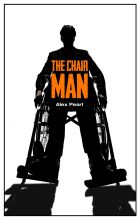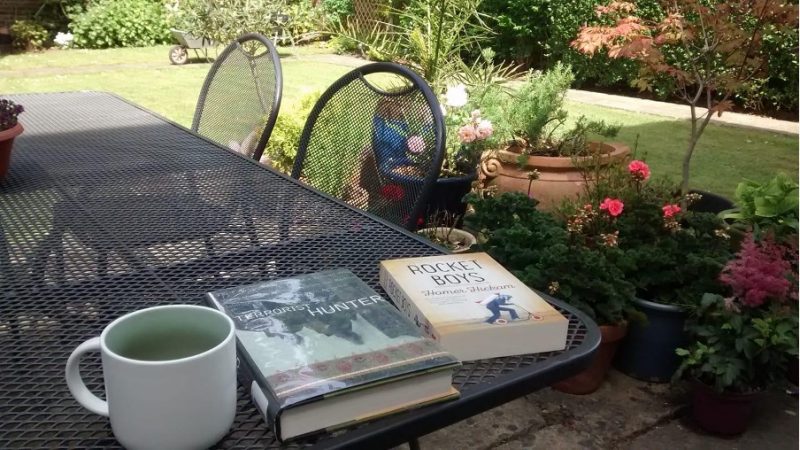The Chair Man by Alex Pearl
What led you into writing?
It was a gradual process, and one that wasn’t entirely planned. Having not excelled academically at school, I found myself pursuing an artistic path by going to art college, and it was here that I became interested in the world of creative advertising and ideas. It was also here that I teamed up with a good friend who was a skilled artist – far more talented than myself. And since we were advised to work as teams of art directors and copywriters, we took the view that I should become the copywriting partner while my other half would be the art director. And so it was that we would eventually gain employment in the advertising industry, and I would start to write copy for press advertisements and the occasional radio and TV commercial. This was back in the 80s when London was arguably producing some of the most creative advertising in the world. It was a fairly brutal world though. You were thrown in at the deep end and you either swam or sank. Fortunately for us, we swam, and did rather well, and I was able to hone my skills as a writer; skills that have served me well. Indeed, advertising is often cited as a very useful training-ground for writers and film directors. The late Alan Parker who started as a copywriter believed that his years in advertising were invaluable, and taught him to tell stories in a particularly short form. Most TV commercials are no more than 30 or 40 seconds in length.
I suppose writing was also something that I had always been reasonably proficient at, and was one of the few subjects at school that just came naturally. And going back to my school days, I had a very unusual and inspiring English teacher by the name of Clive Lawton. He was very charismatic and had an affinity with kids to the extent that he really was on our wavelength. He’d do the most extraordinary things and turn everything on its head. On one occasion he announced that instead of him marking our essays he was going to ask us to mark his, and then handed out old essays he’d written in the past. He’d often tell us that the syllabus was boring, and that we were going to ignore it and have a serious discussion about something fairly contentious like advertising and the blatant use of sexual imagery. The point of his lessons was to make us think and to convey to us the power of words. And by teaching in this wholly unconventional and radical manner, he not only gained the attention of every single child in that classroom. He also instilled a love of words and ideas. And as a result, every child in my class passed their O level exams, and nobody received anything less than a B grade.
Later on when I started working as an advertising copywriter, my Creative Director, a man by the name of Ken Mullen was also influential. Ken was and still is a brilliant writer. He had two degrees in English Literature from Oxford University and is the only English advertising copywriter to have had his work quoted in the Oxford Book of Modern quotations. These included two headlines he had penned for The Times newspaper when he was working for Leo Burnett – ‘Our sages know their onions.’ And ‘No pomp. Just circumstance.’ He encouraged his entire creative department to immerse themselves in literature, cinema and the arts in general. But perhaps, more importantly, he wore his learning lightly and was incredibly funny and approachable. He was, in short, the best boss you could ever hope for.
On one occasion, he and his art director had created a press campaign for marketing real fires and fireplaces for domestic use; a campaign that revolved around testimonials by famous authors. Ken penned a simple headline: ‘Pictures I See in my Fire’, and invited various authors to write a long piece to fill an entire page of The Times newspaper. If memory serves me correctly, he asked a number and the first to accept the challenge were Frederick Raphael, the playwright, Charlotte Bingham and Beryl Bainbridge. All three pieces were eventually penned, approved by the client and cleverly designed like editorial pieces with a small photograph of each author sitting next to their open fire at home. Beryl Bainbridge’s auto-biographical piece about her childhood was touching and like everything she writes, absolutely captivating. The press advertisement went on to win a silver award at the prestigious British Design and Art Director Awards as the best written advertisement to appear in any publication that year. And I had the pleasure of sitting next to Beryl Bainbridge at the award ceremony. Had it been anyone else, I’m sure I’d have been too scared to utter a single world, but the lovely Beryl Bainbridge was one of those remarkable people that just made you feel at ease, so I ended up chatting away to her as if she was my nextdoor neighbour. The thing I remember vividly is that every few minutes she’d produce a notebook and take notes, occasionally asking how to spell a certain name or title. She explained that if she didn’t write down interesting details and observations, they’d simply evaporate like dreams. Looking back on that experience now makes me think that she may very well have inspired me back then to write something other than advertising copy.
It would take a few years, but then one day I began writing a story as an experiment. I had no fully developed story in my head and 15,000 words later, I simply came to a crashing halt. I had no idea where I could take the narrative, and it was put to one side until my daughter picked it up, read it and then nagged me endlessly to finish it. I never did. But a couple of years later I had an idea for a children’s book, and this time I spent some considerable time working on a detailed synopsis. At the time I was working at a large agency with the same working partner from college days, who had just decided to retire from the industry at the grand old age of 47. And at that time the agency was undergoing an enormous merger with another lumbering giant. Some bright spark at the time described the whole thing as being tantamount to the Hindenberg coming to the rescue of the Titanic. Anyway, the merger was an incredibly painful and time consuming process. In fact, it dragged on for the best part of a year during which all work dried up and my creative director became ostracised and shoved to one side. Rather than just twiddle my thumbs I started working on my first work of fiction.
By the time I was eventually made redundant, all I had to remove from my office was a stack of laminated ads, a showreel, a Collins English Dictionary and a tatty manuscript entitled ‘Sleeping with the Blackbirds’, which made it into print the following year.
How does a typical day look?
I retired from advertising three years ago following a short stint as a freelance copywriter. I might have worked a little longer in normal circumstances as I was only 58 but my wife’s health had taken a sudden turn for the worse and I had in effect become her primary carer. So these days, I find myself doing rather more about the house than I used to. I do all the cooking and gardening, not to mention all those usual daily chores. Reading and writing are forms of relaxation.
This said, I’m not as disciplined as a professional author, as I’m far too slow. I take my hat off to those who do write professionally for a living. I write at my leisure purely for pleasure.
My debut thriller ‘The Chair Man’ took me about a year and a half to write, but that doesn’t include the research, which took me another six months or so. But then, my days are not regimented in any shape or form. Some days I write and some days I don’t. So in this respect, I’m not a conventional writer constantly tapping away at a keyboard and not having a break until 10,000 words have been bashed out.
A typical day for me is in fact a totally unplanned and unpredictable one. And I suppose I like not knowing how things will pan out. Most days will include a walk on Hampstead Heath nearby and the preparation of two meals. If the weather is good I might find myself gardening. When I do write, I generally don’t write for more than two or three hours at a time. But I don’t have any particular desk or writing habits. I can write anywhere that’s reasonably comfortable, whether it be at a desk, table or just in a comfortable chair. In the summer months I often write at a desk in the attic. I use a PC and a Chromebook and use Google Docs. I’m also happy to write away from home and have been known to write in cafes and holiday cottages. My first book (‘Sleeping with the Blackbirds’) was written almost exclusively in my office in Victoria where I was working at the time. I was in effect waiting to be made redundant; a wait that lasted the best part of a year, by which time I had completed 99% of my first work of fiction.
In what ways do your characters test your abilities?
It’s often said that you should write about what you know, but it’s also true to say that many great writers enjoy the challenge of writing about areas that are new to them; areas that require meticulous research and study. And I guess the same really applies to creating characters that inhabit the pages of your novel. In my case, some of my characters are loosely based on real people or blends of real people; people I have encountered or people I have read about. In my first book, ‘Sleeping with the Blackbirds’ one of my characters is based entirely on a real person I knew from childhood who was a disabled gardener who used his bicycle and gardening fork to support himself. He was a wonderful gardener. But he’s the kind of character you couldn’t easily conjure from thin air unless you’d actually seen him and spoken to him. In my latest novel, ‘The Chair Man’ one of the key characters is a talented engineer who can build and fly microlights. I don’t know anything about flying microlights so I had to do a reasonable amount of research, which involved talking at length to someone who builds and flies them. Other characters that populate the pages include terrorists and British intelligence officers and spies. All of whom required a combination of research and leaps of imagination. I read several books to get inside the head of a terrorist. Among these were ‘The Terrorist Hunter’ written anonymously by an Iraqi woman who escaped Sadam Hussein’s regime and ended up spying for the Americans, and ‘The Islamist’ by Ed Husain. Another book – an obscure self-published paperback written by academics gave me an insight into the ways in which extremists used the internet in 2005 to communicate secretly online. So my characters certainly did test my abilities as I had to familiarise myself with their worlds and attempt to see the world through their eyes.
What’s your setup?
I write on an old Chromebook around the house and occasionally out of the house, as well as on a PC with Widows 10 in my attic. I use Google Docs and Grammarly, which can be useful. The set-up below is my office in the attic where I write in the summer months. It’s too cold up here in the winter. As you can see, I have a number of CDs up here and a music system, but I never play music when writing. If I did I wouldn’t get anything done as I’d find it too distracting. My musical taste is eclectic, encompassing everything from early baroque to rock. In the summer I also enjoy writing in the garden.
My attic office

The outdoor office in the summer months.
What lasting effects have your favourite authors had on your writing and style?
I’m sure authors I have read and enjoyed have influenced my writing in some form. It’s inevitable that a style or form of writing will rub off on all of us. But it isn’t something I set out to do. I don’t consciously want to emulate any particular style of writing though I am aware of influences. When I wrote my first book ‘Sleeping with the Blackbirds’ I deliberately set out to write it in an old-fashioned style redolent of authors like Richmal Crompton and Clive King. Looking back on this, I think this was, in part, down to my annoyance at work where both clients and agency account men were obsessed with writing copy in a tone of voice that was ‘modern’ and ‘forward looking’. As a result, words that were deemed old-fashioned would be removed from my copy, or I’d be asked to rewrite certain passages.
What do you do for inspiration?
Walking on Hampstead Heath is a good way to unwind and get rid of the cobwebs. As is listening to music, particularly JS Bach. His Goldberg Variations for solo piano are hard to beat if you really want to chill out and maybe, just maybe find some inspiration. A good cup of tea and a piece of toast with marmalade is probably also as good a way as any to recharge those batteries. The last place I will ever find inspiration is at my desk in front of a computer or a blank piece of white paper.
What repeating themes do you find yourself pulling into your stories?
That’s a really good question. I have only written two novels and a short story, but now that I think about it, there are in these stories recurring themes that hadn’t occurred to me until now. All three narratives, although very different in style and content, feature protagonists who are victims of cruelty. In my first book ‘Sleeping with the Blackbirds’ Roy Nuttersley is treated dreadfully by his parents and is bullied at school; my short story is about 19-year-old Thomas Highgate who enlists to fight in the First World War but is terrified by the horrors of war, deserts and is callously executed by firing squad; and Michael Hollinghurst is the protagonist in my thriller ‘The Chair Man.’ He is the victim of a terrorist attack and now seeks retribution. All three of my stories also examine themes of friendship and betrayal. I guess these are pretty profound, universal themes that interest me as a writer and make for engaging and compelling narratives.
How do you wind down?
I listen to the radio a fair bit – mainly Radio 4. I also watch films on Netflix. I have some DVDs lined up too. ‘The Sopranos’ is one such set. I never did see it, so I’m looking forward to that. I listen to music, chiefly classical and jazz. And I do enjoy gardening. And then, there’s walking. All these activities help me to unwind.
What sort of challenges do you regularly overcome while designing your world/setting?
These are the everyday mundane challenges that get in the way of life. I’m talking about loading and emptying the dishwasher; loading and emptying the washing machine; ironing; cleaning and so on. The jobs you don’t want to do but have to.
What are you reading at the moment?
I am currently reading ‘The Constant Gardener’ by John le Carré and just finished ‘Beneath a Scarlet Sky’ by Mark Sullivan. ‘The Constant Gardener’ is utterly brilliant in every way. Sullivan’s book was very good but not quite in the same league. I also recently read ‘The Upright Piano Player’ by David Abbott, which I would certainly recommend if you like Ian McEwan. I wrote the following review:
David Abbott’s haunting and beautifully constructed first and last novel deserves a wider readership. David Abbott is regarded as one of the finest advertising copywriters of his generation. As a young graduate back in the 80s, I remember the thrill of being offered a student placement at his agency Abbott Mead Vickers, along with my then creative partner. We were in our final year at art school and had set our sights on a career as a creative team in one of London’s creative advertising agencies. Luckily for us, one of AMV’s senior art directors had graduated from our college (Maidstone College of Art), so it only took a letter from one of our tutors to this former student to secure our two-week placement. On arriving at the allotted hour, we were ushered up to the creative floor of a recently refurbished building that had that distinctive new building smell. Everything was grey and black, which was the height of chic back in the late 80s. In fairness, it would still look sophisticated today. We had our own sizeable office for two weeks. But the greatest disappointment to befall us was that the great man himself was on holiday and would not return until we had departed. So there would be no chance to contrive an impromptu meeting with him in the company lift of a morning. Abbott had cemented his reputation for writing memorable press ads for the likes of Volvo, Sainsbury’s, The Economist and Chivas Regal, to name but a few. But he was equally at home writing TV commercials, and his famous ‘J R Hartley’ TV commercial has gone down in advertising folklore as one of the UK’s best-loved commercials. This said, he will always be remembered for witty headlines; and cogent, eloquent and perfectly structured copy. I remember one of his very long headlines for Chivas Regal that fuelled a lively argument at college. Some of us felt it was truly heartfelt while others found it overly sentimental and cloying. The press ad ran on Father’s Day and read as follows:
Because I’ve known you all my life.
Because a red Rudge bicycle once made me the happiest boy on the street. Because you let me play cricket on the lawn.
Because you used to dance around the kitchen with a tea-towel round your waist.
Because your cheque book was always busy on my behalf.
Because our house was always full of books and laughter.
Because of countless Saturday mornings you gave up to watch a small boy play rugby. Because you never expected too much of me or let me get away with too little. Because of all the nights you sat working at your desk while I lay sleeping in my bed. Because you never embarrassed me by talking about the birds and the bees. Because I know there’s a faded newspaper clipping in your wallet about my scholarship.
Because you always made me polish the heels of my shoes as brightly as the toes.
Because you’ve remembered my birthday 38 times out of 38.
Because you still hug me when we meet.
Because you still buy my mother flowers.
Because you’ve more than your fair share of grey hairs and I know who helped put them there.
Because you’re a marvellous grandfather.
Because you made my wife feel one of the family.
Because you wanted to go to McDonalds the last time I bought you lunch.
Because you’ve always been there when I’ve needed you.
Because you let me make my own mistakes and never once said. “I told you so.
Because you still pretend you only need glasses for reading.
Because I don’t say thank you as often as I should.
Because it’s Father’s Day.
Because if you don’t deserve Chivas Regal, who does?
Abbott later admitted that the ad was, in fact, a love letter to his own father. Whether you like it or not (I happen to like it), it’s a lovely example of Abbott’s perceptiveness and his ability to tap into the way we humans think and feel. And it’s this emotive and powerful line of reasoning that imbues all his copy, whether he’s writing about crumple zones on Scandinavian cars or the health benefits of a Liga baby rusk.
When in 1998, he announced his retirement from the agency he founded in order to take up a new career as an author, none of us gasped in surprise. Here was a man who was already writing the most exquisite prose, albeit in a truncated form. And plenty of other copywriters had taken the plunge before him. Copywriters who certainly hadn’t received the kind of recognition Abbott had. There had been Fay Wheldon ( ‘Go to work on an egg’). There had been Peter Mayle (‘Nice one Cyril’ for Wonderloaf bread). And there had been Salman Rushdie (who readily admits to penning ‘naughty but nice’ for fresh cream cakes).
dmittedly, it took some while to complete his first work of fiction, but in 2010 Abbott’s debut novel ‘The Upright Piano Player’ finally hit the shelves. And quite some novel it is. It was clearly a labour of love as every line has been so well-considered and beautifully honed. Lines like this: Designer gowns from a former era, lovingly preserved in polythene, hang uneasily on bodies that have had no such luck. The book is peppered with such lines, yet the narrative is brisk and not the least bit laboured. And, of course, there’s that sharp perceptiveness about human nature and the little observations that lift the writing to another level. We also get a real feeling for the characters themselves through Abbott’s sharp ear for dialogue. The story itself is an incredibly sad one and is structured like a Kurt Vonnegut novel starting at the end. But in all other respects, it is as far apart from a Vonnegut novel as you could possibly get. Many reviewers have compared the writing to Ian McEwan, and it’s a fair comparison. What is abundantly clear is that ‘The Upright Piano Player’ is an accomplished novel that deserves to share shelf-space with any other novel written in the English language. As a debut novel, it’s remarkable. The story’s protagonist, one Henry Cage is a perfectly affable character on the surface. He has enjoyed a successful career as the founder of his own management consultancy business. But on retirement, it becomes clear that Cage’s personal life is anything but perfect. As the novel progresses, Abbott allows us to peek into Cage’s family dynamics and the fracturing of relationships, which could so easily have been averted. Added into the mix is a string of random incidents that have truly devastating consequences and are well beyond Cage’s control. Together the sequence of events makes for a tragedy of epic proportions and demonstrates the fragility of life. But don’t be put off. The narrative is utterly compelling, and you really do want to spend time in Henry Cage’s company. He is sharp, witty and likeable, if a bit obstinate and set in his ways. The closing line to the novel is utterly heartbreaking, as we know from the very first page how this story ends. And that’s another aspect that I think works so well with this novel. The way it has been structured is really clever. We know from page one how it ends but we don’t quite know how it gets there. But when we do finally get there and everything has been unravelled, the emotional punch of the very last page is enormous and gut-wrenching because we know that the last page isn’t actually the last page.
Having retired from advertising myself and written a couple of self-published novels, I have only just got round to reading ‘The Upright Piano Player’. But I am baffled by the fact that this fine book has received so few reviews on Amazon – no more than a paltry 38 ratings in ten years. My own self-published scribblings have notched up twice as many ratings in ten months. But I’d be the first to admit that my writing pales in comparison. So why on earth isn’t anyone reading this fine book that has been published, I might add, by a mainstream publisher (Quercus)? Am I and those 38 other reviewers on Amazon the only people to rate ‘The Upright Piano Player’ as a terrific read? Surely not.
I speak up for David Abbott’s novel not simply because I believe it to be an extraordinarily lyrical and haunting book, but because David Abbott cannot speak up for himself. He very sadly passed away rather suddenly and unexpectedly in 2014. He was one of the very few advertising men whose obituary made it into the national newspapers as well as the BBC news. This said, his debut novel only appeared as a foot-note among the reams of newsprint devoted to his contribution to British creative advertising. And yet this novel is undoubtedly his crowning achievement. The Guardian rightly described it as ‘a beautifully constructed debut.’ The saddest thing about ‘The Upright Piano Player’ is that it’s Abbott’s first and last foray into the world of literary fiction. We shan’t lay eyes on any other gems from this hugely gifted and overlooked author.
What’s the most useful advice you could give to an aspiring author?
Enjoy your writing and don’t be put off by criticism when it is constructive.
Tell us about the book you’re promoting.
Michael Hollinghurst is a successful corporate lawyer living a comfortable, suburban life in leafy North West London. But on 7 July 2005, his life is transformed when he steps on a London underground train targeted by Islamist suicide bombers. While most passengers in his carriage are killed, Michael survives the explosion but is confined to a wheelchair as a result. Coming to terms with his predicament and controlling his own feelings of guilt as a survivor conspire to push him in a direction that is out of character and a tad reckless. In a quest to seek retribution, he resorts to embracing the internet and posing as a radical Islamist in order to snare potential perpetrators. Much to his surprise, his shambolic scheme yields results and is brought to the attention of both GCHQ and a terrorist cell. But before long, dark forces begin to gather and close in on him. There is seemingly no way out for Michael Hollinghurst. He has become, quite literally, a sitting target.
This is my debut thriller. My intention was to write a compelling story about a successful corporate lawyer who inadvertently becomes a terrorist victim by being at the wrong place at the wrong time. His name is Michael Hollinghurst; he’s a pretty bright, liberal-minded kind of guy; his marriage isn’t in great shape, but he enjoys a great relationship with his two teenage kids Ben and Natasha.
Having stepped on an underground train targeted by suicide bombers, his life is changed in an instant. He is the only survivor in his carriage, but his injuries are serious and leave him in a wheelchair as a tetraplegic.
Coming to terms with his condition and the anger he feels towards the perpetrators motivate him to seek retribution online. And it’s this need for revenge that occupies part two of the book.
The cast of characters is varied and hopefully reasonably fleshed out. The terrorists themselves all have backstories, which will go some way to helping the reader understand their motivations. Interestingly, some readers have felt a great deal of sympathy towards some of the terrorists – particularly Qssim who is a white Muslim convert with a complicated background.
While some will admire Hollinghurs, his actions will always be morally questionable. And his recklessness in putting others at risk, as well as involving the computer skills of a child with autism, also have to be questioned. In this respect, I hope readers find ‘The Chair Man’ a thought-provoking read, while also being entertaining. Many readers have already said that they didn’t see the ending coming and were taken by surprise by the twist in the tail, which for any writer is obviously music to the ear. So on that note, I will let you judge for yourself.
THE CHAIR MAN IS NOW FREE AS AN EBOOK ON ALL PLATFORMS INCLUDING AMAZON FOR THE DURATION OF COVID19.
👋 Hi! I run Author Interviews
As a new writer I found myself itching to contribute to a thriving, creative community, so I made Author Interviews and I've met loads of wonderful people in the process. You can buy my debut fantasy RINGLANDER: THE PATH AND THE WAY from Amazon.





